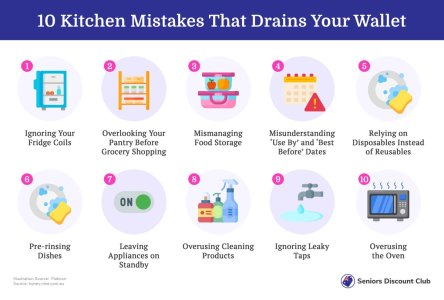10 surprising kitchen mistakes draining your wallet every day
By
Seia Ibanez
- Replies 30
The kitchen is the heart of the home, where meals are prepared and memories are made. But did you know it could also be where you're unknowingly wasting money?
Small habits and overlooked details can add to significant spending on groceries, utilities, and more.
Let's explore 10 ways you might unknowingly waste money in your kitchen and how to fix them.
1. Ignoring Your Fridge Coils
The fridge coils, often hidden and forgotten, can be a silent money drain. When covered in dust and grime, they can make your fridge less efficient, leading to higher power bills.
According to Fast Fridge Repairs, dirty coils could add $15 to $20 to your monthly power bill. Regular cleaning of these coils can help your fridge run more efficiently and save you money in the long run.
2. Overlooking Your Pantry Before Grocery Shopping
Before heading out for your grocery shopping, take a moment to check what you already have in your pantry and fridge.
This simple habit can prevent you from doubling up on items, especially perishable ones that need to be used quickly.
A well-planned shopping list can save you from unnecessary spending and reduce food waste.
3. Mismanaging Food Storage
Proper food storage is key to extending the shelf life of your groceries.
From using airtight containers to storing milk in the right section of the fridge, these small steps can prevent food from spoiling prematurely.
This means you won't have to replace items as frequently, saving you money.
4. Misunderstanding 'Use By' and 'Best Before' Dates
Many confuse 'use by' and 'best before' dates, leading to unnecessary food waste.
While 'use by' labels indicate when a product may no longer be safe to eat past a certain date, 'best before' dates simply suggest when the product may lose its quality.
Understanding these labels can help you make the most of your groceries and avoid throwing away perfectly good food.
According to Dr Rozita Vaskoska, Commonwealth Scientific and Industrial Research Organisation's (CSIRO) Consumer Food Safety Spokesperson, ‘The use-by dates are very firm. The product shouldn't be used (past that date).'
But when it comes to ‘best before’ dates, she said that ‘they reflect the quality will drop after that date, it doesn’t mean it will be unsafe to use’.
5. Relying on Disposables Instead of Reusables
While paper towels, plastic wrap, and snap-lock bags are convenient, they can also be a constant drain on your budget by having you go for replacements as soon as they run out.
Consider investing in reusable alternatives like cloth towels, silicone ziplock bags, and glass containers. Not only are these options more environmentally friendly, but they can also save you money in the long run.
6. Pre-rinsing Dishes
Contrary to popular belief, pre-rinsing dishes before loading them into the dishwasher is not necessary.
This habit wastes a significant amount of water, leading to higher utility bills. Moreover, modern dishwashers are designed to detect the level of dirt on dishes and adjust their cleaning cycle accordingly.
By skipping the pre-rinse, you can save water and ensure your dishwasher cleans effectively.
7. Leaving Appliances on Standby
Leaving appliances like your microwave on standby may seem harmless, but it's actually using more power than you're paying for.
By turning off these appliances at the wall, you could save yourself $100 to $150 annually, according to Simply Energy.
A safer alternative is to invest in a ‘smart power board’. These devices are specifically designed to detect when an appliance should be cut off from its energy supply and then turn it off.
8. Overusing Cleaning Products
When it comes to cleaning products, less is often more. Overusing products like dishwashing powder and washing-up detergent not only leads to unnecessary spending but can also be less effective.
By using these products sparingly, you can make them last longer and save money.
9. Ignoring Leaky Taps
A leaking tap might seem like a minor annoyance, but it can lead to significant water waste over time. Some services estimate that a leaky tap can lead to about 260 litres of water lost yearly, amounting up to $200 in excess charges in the same time.
Fixing leaks promptly can save you money and conserve water, a precious resource.
10. Overusing the Oven
The oven is the most expensive cooking appliance in the kitchen. Consider using smaller appliances like the microwave or toaster where possible.
According to CHOICE, smaller appliances cost less to run, especially if they don't require pre-heating.

While we've highlighted the top 10 ways you might be wasting money in your kitchen, it's also important to understand the hidden costs associated with your kitchen appliances.
Regular maintenance and timely repairs can help ensure your appliances are running efficiently, saving you money in the long run.
Moreover, when it's time to replace an appliance, consider investing in energy-efficient models. While these may cost more upfront, they can save you money in the long term through lower energy bills.
 What other kitchen budget-saving tips do you do? Let us know your thoughts and any additional tips you might have in the comments below!
What other kitchen budget-saving tips do you do? Let us know your thoughts and any additional tips you might have in the comments below!
Small habits and overlooked details can add to significant spending on groceries, utilities, and more.
Let's explore 10 ways you might unknowingly waste money in your kitchen and how to fix them.
1. Ignoring Your Fridge Coils
The fridge coils, often hidden and forgotten, can be a silent money drain. When covered in dust and grime, they can make your fridge less efficient, leading to higher power bills.
According to Fast Fridge Repairs, dirty coils could add $15 to $20 to your monthly power bill. Regular cleaning of these coils can help your fridge run more efficiently and save you money in the long run.
2. Overlooking Your Pantry Before Grocery Shopping
Before heading out for your grocery shopping, take a moment to check what you already have in your pantry and fridge.
This simple habit can prevent you from doubling up on items, especially perishable ones that need to be used quickly.
A well-planned shopping list can save you from unnecessary spending and reduce food waste.
3. Mismanaging Food Storage
Proper food storage is key to extending the shelf life of your groceries.
From using airtight containers to storing milk in the right section of the fridge, these small steps can prevent food from spoiling prematurely.
This means you won't have to replace items as frequently, saving you money.
4. Misunderstanding 'Use By' and 'Best Before' Dates
Many confuse 'use by' and 'best before' dates, leading to unnecessary food waste.
While 'use by' labels indicate when a product may no longer be safe to eat past a certain date, 'best before' dates simply suggest when the product may lose its quality.
Understanding these labels can help you make the most of your groceries and avoid throwing away perfectly good food.
According to Dr Rozita Vaskoska, Commonwealth Scientific and Industrial Research Organisation's (CSIRO) Consumer Food Safety Spokesperson, ‘The use-by dates are very firm. The product shouldn't be used (past that date).'
But when it comes to ‘best before’ dates, she said that ‘they reflect the quality will drop after that date, it doesn’t mean it will be unsafe to use’.
5. Relying on Disposables Instead of Reusables
While paper towels, plastic wrap, and snap-lock bags are convenient, they can also be a constant drain on your budget by having you go for replacements as soon as they run out.
Consider investing in reusable alternatives like cloth towels, silicone ziplock bags, and glass containers. Not only are these options more environmentally friendly, but they can also save you money in the long run.
6. Pre-rinsing Dishes
Contrary to popular belief, pre-rinsing dishes before loading them into the dishwasher is not necessary.
This habit wastes a significant amount of water, leading to higher utility bills. Moreover, modern dishwashers are designed to detect the level of dirt on dishes and adjust their cleaning cycle accordingly.
By skipping the pre-rinse, you can save water and ensure your dishwasher cleans effectively.
7. Leaving Appliances on Standby
Leaving appliances like your microwave on standby may seem harmless, but it's actually using more power than you're paying for.
By turning off these appliances at the wall, you could save yourself $100 to $150 annually, according to Simply Energy.
A safer alternative is to invest in a ‘smart power board’. These devices are specifically designed to detect when an appliance should be cut off from its energy supply and then turn it off.
8. Overusing Cleaning Products
When it comes to cleaning products, less is often more. Overusing products like dishwashing powder and washing-up detergent not only leads to unnecessary spending but can also be less effective.
By using these products sparingly, you can make them last longer and save money.
9. Ignoring Leaky Taps
A leaking tap might seem like a minor annoyance, but it can lead to significant water waste over time. Some services estimate that a leaky tap can lead to about 260 litres of water lost yearly, amounting up to $200 in excess charges in the same time.
Fixing leaks promptly can save you money and conserve water, a precious resource.
10. Overusing the Oven
The oven is the most expensive cooking appliance in the kitchen. Consider using smaller appliances like the microwave or toaster where possible.
According to CHOICE, smaller appliances cost less to run, especially if they don't require pre-heating.

While we've highlighted the top 10 ways you might be wasting money in your kitchen, it's also important to understand the hidden costs associated with your kitchen appliances.
Regular maintenance and timely repairs can help ensure your appliances are running efficiently, saving you money in the long run.
Moreover, when it's time to replace an appliance, consider investing in energy-efficient models. While these may cost more upfront, they can save you money in the long term through lower energy bills.
Key Takeaways
- Keeping fridge coils clean can save $15 to $20 on your power bill each month by increasing appliance efficiency.
- Checking existing food supplies before grocery shopping prevents doubling up on items, especially perishables, and can reduce food waste and overspending.
- Correct food storage and understanding the difference between 'use by' and 'best before' dates can prolong food lifespans, preventing premature disposal and unnecessary repurchasing.
- Utilising reusable items, fixing leaks, turning off standby appliances, using appropriate amounts of cleaning products, and opting for smaller cooking appliances can lead to significant savings on household expenses.








